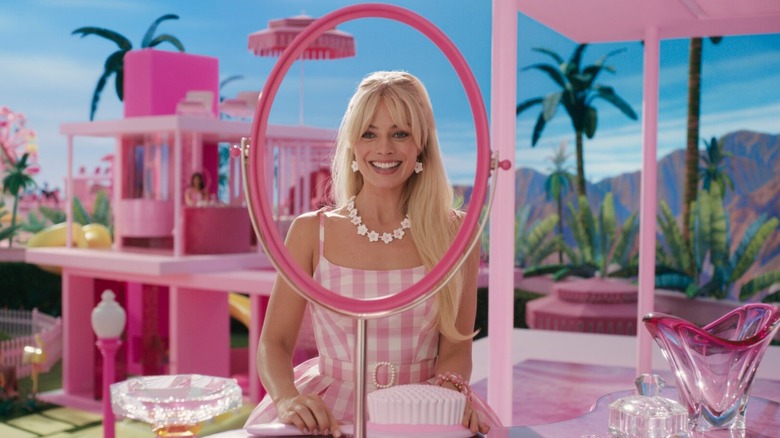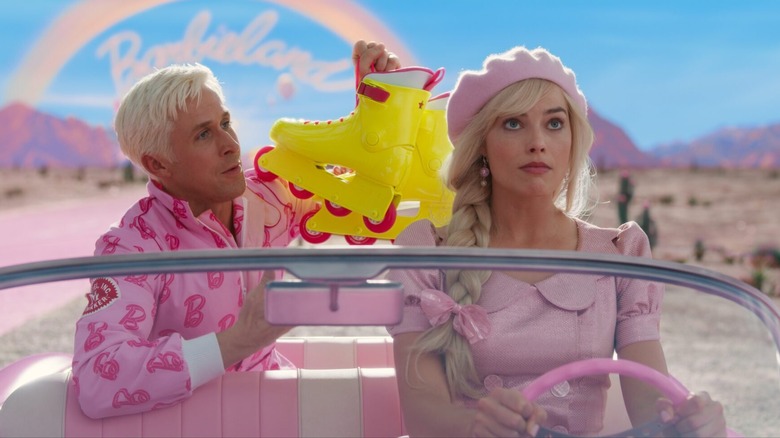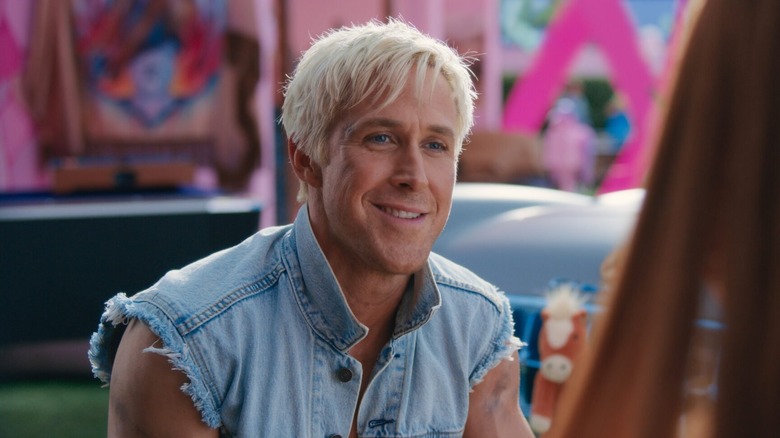Barbie Review: Existential Dream House
- Relentlessly inventive
- The best cast ever assembled for a movie based on a toy line
- Maintains a very delicate and unique tone throughout
- Ambitious!
- Perhaps a tad too ambitious
- The film is shaggy pacing-wise as a result
From the outset, Greta Gerwig's hotly anticipated "Barbie" film has been a study in contradictions. Greta-pilled cinephiles have salivated at promotional interviews where the indie auteur name-checks influences like Jacques Tati, Jacques Demy, and Michael Powell and Emeric Pressburger. But others have balked at the sheer commercial weight Warner Bros. and Mattel have thrown behind the film's onslaught of marketing, with pink-themed tie-ins oozing out all the zeitgeist's pores. At the core of that marketing is a filmmaker whose short but storied filmography counts among them some of the most beloved modern films about womanhood, now tasked with crafting a tentpole-budgeted popcorn flick about the world's most iconic doll.
We're no strangers to directors from the Sundance set graduating to the blue-screen worlds of comic book adaptations, bringing the adolescent power fantasies historically aimed at little boys to life with some simulacrum of artistic maturity, futile though those stylistic embellishments may be. But tackling something so girly, and thusly easily dismissed as even more frivolous than the cape-driven blockbusters, feels like even more of a challenge. Barbie, as a pop-cultural concept, is a thorny one to unravel, existing as she does at the uneasy intersection of commerce and identity.
But here Gerwig artfully outwits the eventual think pieces and potential backlash by making her "Barbie" a rumination on the ineffable mysteries of life and the Kobayashi Maru that is being a woman. It's a genre-blending, tonally audacious film that wrestles with the patriarchy and capitalism under the guise of a movie that will surely sell more merchandise than any other this year. But is that duality a gift or a curse?
Welcome to the dollhouse
As Helen Mirren's Narrator tells us in the film's prologue, Barbie can be anything. The film introduces us to a diverse cavalcade of Barbie variants, all named Barbie, with a variety of occupations. Actresses ranging from Hari Nef to Issa Rae to Alexandra Shipp all play doctors, presidents, and award-winning authors. But Margot Robbie is adjectiveless Barbie. As the story progresses, she comes to be known as Stereotypical Barbie, the Barbie you think of when someone says "Barbie." She is but one part of the elaborate, feminist utopia that is Barbieworld, where every iteration of Barbie that has ever lived exists in blissful ignorance of one inconvenient fact: that the real world is not a similarly idyllic society inspired by the accomplishments of these ambitious dolls.
But when our Barbie becomes plagued by thoughts of death, cellulite, and flat, archless feet, Weird Barbie (Kate McKinnon) sends her to the Real World to find the origin of these changes so she can be reset to factory settings. Her fish-out-of-water experience is good for some laughs and exaggerated in the marketing materials, but the main thrust of the film's plot isn't about Barbie and her Ken (Ryan Gosling) traversing reality. Rather, it's about what ideas they bring back home with them and how those errant concepts corrupt their pastel-colored paradise.
The film's twists and revelations are best experienced firsthand, so we'll leave the rest of the narrative specifics to your imagination until you can actually see it. But "Barbie" is so much more than the particulars of its plot. Gerwig, alongside partner Noah Baumbach, who gets a co-writer credit, has dreamed up an ambitious, thoughtful, and dizzying pop art piece. The film functions dually as a highly stylized musical comedy that's as entertaining as any movie ostensibly made for kids can possibly be. But between the broader comedic bits and some of the quirkier meta elements, there are these quiet, intimate little touches that feel so emotional as to be overpowering.
America Ferrera, who plays a human employee of Mattel, delivers a monologue about the inherent difficulties of womanhood that is sure to be chopped up, deep-fried with filters and sparkle effects as a fancam on TikTok the minute a bootleg of the film is released to torrent sites with sufficient visual fidelity. But for all its soulful meditations and show-stopping musical numbers, perhaps the most surprising and impressive element of "Barbie" is the fascinating way the film tackles the gender war.
You are Ken-ough
One of the film's few questionable decisions is just how big a part Ken plays in its proceedings, at times feeling like a more direct co-lead than anticipated. On the one hand, Ken is arguably one of Ryan Gosling's best performances. Sigma Grindset Letterboxd users have long reveled in the "he's literally me" meme about how many of Gosling's protagonists represent stand-ins for disaffected male youths' feelings of isolation and impending doom. Here, Gosling channels the raw energy of that collective yearning into his depiction of Ken, a well-meaning himbo who has no identity outside of wanting to impress Barbie. Through the film, we see how his seemingly innocent aims to finally be respected and adored cause catastrophic damage to the Barbieland ecosystem. But even with the comedic sides of his subplot, it feels like Gerwig acknowledges the ways in which the patriarchy alienates and reduces men, too, and that the ways we're compartmentalized may be different based on identifiers like gender, but we're all being exploited and minimized by the status quo just the same.
This is a movie where Ryan Gosling belts a ballad called "I'm Ken" wondering if he will ever be enough two reels removed from him telling a businessman in the real world that he's not doing patriarchy very well if he won't just give Ken a job despite not having an MBA. "Barbie" balances absurdist humor with gut-wrenching introspection in a way that shouldn't be possible in a movie powered by a marketing machine this crass and overt.
Your mileage may vary as to whether or not the questions Gerwig asks or the conclusions that can be drawn from them will satisfy, but there's so much style on display, so much heart to be felt, and so many laughs to be had that the post-show debates won't matter so much. That a movie about a doll will resonate enough to even have such conversations feels like a real victory.
"Barbie" premieres in theaters on July 21.
This piece was written during the 2023 WGA and SAG-AFTRA strikes. Without the labor of the writers and actors currently on strike, the movie being reviewed here wouldn't exist.


